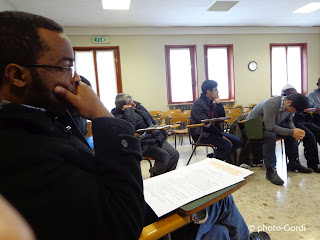ANGELUS POPE FRANCIS 21 FEBRUARY 2016
ANGELUS POPE
FRANCIS
Saint Peter's Square
Second Sunday of Lent, 21 February 2016
Second Sunday of Lent, 21 February 2016
Dear Brothers and Sisters, Good morning!
The
second Sunday of Lent presents us the Gospel of Jesus’ Transfiguration.
The apostolic visit
that I made to Mexico some
days ago was an experience of transfiguration for all of us. How so? Because
the Lord has shown us the light of his glory through the body of the Church, of
his holy people that live in this land. It is a body so often wounded, a people
so often oppressed, scorned, violated in its dignity. Therefore the various
encounters we experienced in Mexico were truly full of light: the light of a
faith that transfigures faces and illumines our path.
The
spiritual “centre of gravity” of my pilgrimage was the Shrine of Our Lady of
Guadalupe. To remain in silence before the image of the Mother was my principal
aim. I thank God that he gave me this opportunity. I contemplated and I allowed
myself to be gazed upon by she who carries imprinted in her eyes the gaze of all
her children, gathering up the sorrows caused by violence, kidnapping,
assassinations, the violence against so many poor people, against so many
women. Guadalupe is the most visited Marian shrine in the world. From all over
the Americas, people go to pray where la Virgen Morenita appeared
to the Indian, St Juan Diego, which set in motion the evangelization of the
continent and its new civilization, a fruit of the encounter between diverse
cultures.
This
is precisely the inheritance that the Lord has entrusted to Mexico: to care for
the richness of diversity, and at the same time, to manifest the harmony of a
common faith, a sincere and robust faith, accompanied by a great force of
vitality and humanity. Like my predecessors, I also went to confirm the Mexican
people in their faith, and at the same time to be confirmed. My hands are full
of this gift so that it goes out as a benefit to the universal Church.
A
luminous example of what I am saying was given by families: the Mexican
families received me with joy as a messenger of Christ, pastor of the whole
Church. At the same time, they presented to me strong and clear testimonies,
testimonies of a living faith, a faith that transfigures life, and this to
edify all of the Christian families of the world. The same can be said about
the youth, the consecrated, the priests, the workers, the imprisoned.
Thus
I give thanks to the Lord and to the Virgin of Guadalupe for the gift of this
pilgrimage. I also thank the President of Mexico and the other civil
authorities for their warm welcome. I deeply thank my brothers in the
episcopate and all of the people who collaborated in various ways.
We
raise up special praise to the Most Holy Trinity for having wanted on this
occasion to bring about in Cuba the encounter between the Pope and the
Patriarch of Moscow and All Russia, our dear brother Kirill. It was an
encounter also much desired by my predecessors. This event is also a prophetic
light of resurrection, which the world today needs more than ever. May the Holy
Mother of God continue to guide us on the path of friendship and unity. Let us
pray to the Virgin of Kazan, of whom Patriarch Kirill gave me an icon.
After the Angelus:
Dear
brothers and sisters, tomorrow in Rome begins an international conference
entitled “For a World Without the Death Penalty,” sponsored by the Sant’Egidio
Community. I hope that this conference might give new strength to efforts to
abolish the death penalty. A spreading opposition to the death penalty, even as
an instrument of legitimate social defence, has developed in public opinion,
and this is a sign of hope. In fact, modern societies have the ability to
effectively control crime without definitively taking away a criminal’s chance
to redeem himself. The issue lies in the context of a perspective on a criminal
justice system that is ever more conformed to the dignity of man and God’s
design for man and for society. And also a criminal justice system open to the
hope of reintegration in society. The commandment “thou shall not kill” has
absolute value and pertains to the innocent as well as the guilty.
The
Extraordinary Jubilee of Mercy is a propitious occasion to promote in the world
a growing maturity for ways to respect life and the dignity of each person.
Because even a criminal has the inviolable right to life, a gift of God. I
appeal to the consciences of leaders, that they come to an international
consensus aimed at abolishing the death penalty. And to those among them who
are Catholic, may they carry out an act of courage, giving an example that the
death penalty not be applied in this Holy Year of Mercy.
All
Christians and men and women of good will are called today to work towards
abolishing the death penalty, as well as improving prison conditions, in
respect of human dignity and of those people deprived of freedom.
Lent
is an opportune time to travel a path of conversion that has mercy at its
centre. Because of this, I’ve decided to give to those who are here in the
square some “spiritual medicine” called “Misericordina”. We did this once
before, but this one is better, it is “Misericordina-Plus”: a little box that
has a rosary ring and a little image of the Merciful Jesus. Volunteers, including
the poor, the homeless, refugees and also religious, will now distribute them.
Receive this gift as a spiritual aid to spread pardon and fraternity,
especially in this Year of Mercy.
I
wish all of you a good Sunday, and please don’t forget to pray for me. Have a
good lunch, and arrivederci!
© Copyright - Libreria
Editrice Vaticana






























